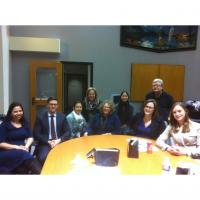By Heather Thompson
On Friday, January 11, 2013, Professor Catherine Bell hosted a small group dinner at the University of Alberta Law Centre. The purpose of the event was to gather Catherine’s current and former students in Edmonton who have been involved with the IPinCH Yukon First Nations (YFN) case study, to celebrate two publications in which students were involved as researchers and co-authors.
It was also an opportunity to meet Alexis Bunten, the IPinCH Project Ethnographer. It was a fun and informative evening in which we were able to share and learn from everyone’s varied involvement with IPinCH, and to hear from Alexis about her role meeting and connecting with team members and other IPinCH affiliates. We were also joined by Sean Robertson, a former IPinCH graduate fellow and current IPinCH Associate, recently appointed as a Professor to the Faculty of Native Studies, University of Alberta. Former and current law students in attendance included Andy Paterson, Susan Rawlins, Heidi Besuijen, Laura Skorodenski, and Heather Thompson. Rounding out the group were Saori Miyazaki, a visiting doctoral student from Osaka Law School, and doctoral candidate Neil Reddekopp, both working under Professor Bell’s supervision and participating in IPinCH research and activities in various capacities. Unfortunately two of the co-authors we were celebrating, Caleigh Sheir (LL.B.) and Dr. Jessica Lai were unable to attend. Jessica, a post-doctoral student from Switzerland became involved with the project through a research mission she did in Canada with Professor Bell in the summer of 2012. Also unable to attend were IPinCH fellows Dr. Nicole Aylwin (Ph.D. candidate and Director of Research York Centre for Public Policy) and Claire Poirier (Ph.D. candidate, Memorial University of Newfoundland, Archaeology).
Conducted in collaboration with the Champagne and Aishihik First Nations, Carcross-Tagish First Nation, Tr'ondek Hwech'in First Nation, and the Ta’an Kwach’än Council, the YFN project is facilitated by the SSHRC-funded Intellectual Property Issues in Cultural Heritage (IPinCH) Project. The case study has provided unique legal, intercultural and interdisciplinary research opportunities for undergraduate, graduate students at the Faculty of Law, University of Alberta, and elsewhere as well as tangible benefits to our Yukon First Nation partners and their communities.
Following the settlement of their respective land claim and self-government agreements, Yukon First Nations own and have responsibility for managing Heritage Resources on their Settlement Lands, while Canadian governments (Yukon and Canada) have some responsibility for managing Heritage Resources on other lands in the Yukon Territory. Wherever located, heritage resources related to the culture and history of Yukon Indian People are to be managed consistent with Yukon First Nations values and culture. The objectives of the Yukon First Nations case study are to:
• Document Yukon First Nations’ values regarding heritage and heritage resource management (HRM);
• Document tangible and intangible cultural meanings and practices, and the role that people, places, things and activities of recognized heritage value have in cultural identity and cultural sustainability;
• Compare Yukon First Nations and mainstream Canadian legal and government understandings of heritage, rights, responsibilities, and management;
• Help provide direction on the stewardship (management) of heritage resources on Yukon First Nations lands and in the broader Yukon territory.
As a research assistant, my primary involvement with the project to this point has been transcribing some of the group discussion sessions that were undertaken this past summer in the Yukon and to organize them thematically. During this time I have been plugged into my computer with the volume cranked up, listening to fascinating stories and acquiring valuable insights about the meaning of heritage and its relationship to Yukon First Nations. In the next phase of the project I will be involved in legal research relating to interpretation of the land claim and its implementation through law and policy.
Having done much of my work independently, it was a real pleasure to meet with other members of the project over dinner, and gain a better perspective of how my work fits into the broader picture. I walked away from the evening feeling truly fortunate that I am associated with IPinCH, and I look forward to my continued involvement.






